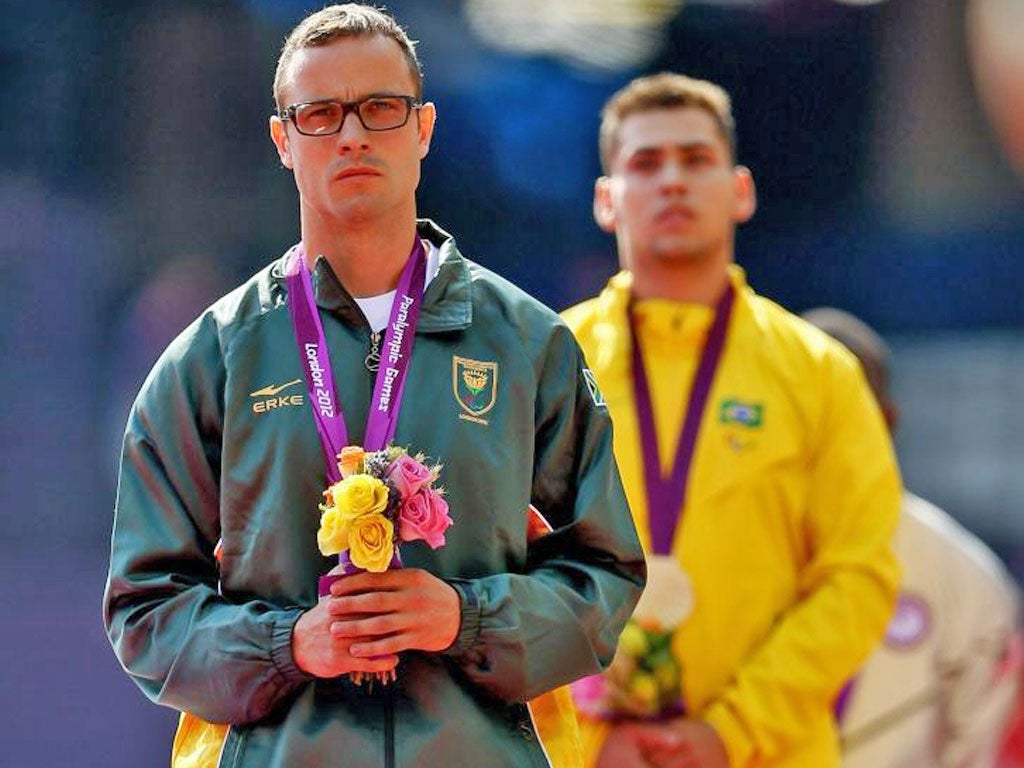Blade runners prepare for rematch as Oscar Pistorius stands firm after outburst following Alan Oliveira's victory

"He has an unfair advantage." They are words one could never have imagined coming from the lips of Oscar Pistorius, so regularly were they said about him, and so tirelessly did he fight to overturn them. His outburst on Sunday night, after he lost to Brazil's Alan Oliveira in the T43/44 200m, opens cans of so many entangled worms it is difficult to know where to begin.
But it has emerged that Pistorius first contacted the International Paralympic Committee (IPC) over the issue of the potentially unfair advantage given to those with longer blades six weeks ago, after hearing that the American Blake Leeper – who took bronze – dramatically improved his performances in the American trials.
"I have to admit it's the first time I've had an athlete call me up," said Craig Spence, the IPC's communications chief, prompting suspicion that Mr Pistorius, who had not lost a 200m race in nine years, might have seen Sunday night's eventualities coming from a lot further off than eight metres behind him on the home straight.
Pistorius was quick to apologise yesterday for the timing of his outburst, having gone straight to the television cameras from the finish line and branded the race "absolutely ridiculous". He twice overnight congratulated his opponent, issued a statement saying he should not have overshadowed Oliveira's "moment", which he undoubtedly did, and appeared sheepish and bashful on the podium at yesterday's medal ceremony.
But Pistorius has not retracted the criticism: that Oliveira's longer blades increase his stride length and give him an unfair advantage. Oliveira admitted yesterday that he has been using his new longer blades for only three weeks. They give him a race height of 181cm, compared with 176cm for his previous racing blades and 177cm for his every day prostheses.
They are in keeping with the formula set by the IPC, which measures an athletes arms, uses that to work out a range of how long their legs would be were they not amputated, then states a maximum allowed length. Oliveira's are at the outer limit of his range. Pistorius' are not.
The two are likely to run against each other again in Thursday night's 100m final and Saturday night's 400m final, offering Pistorius a chance to settle the score – or to reignite the controversy.
The time Oliveira ran on Sunday was a second faster than he could run a year ago, in a race lasting a little over 20 seconds – but he claimed it was down to a new training regime.
"I decided to try the new blades three weeks ago, a decision made by me and my coach," he said. "The prostheses do not run the race on their own. There is an athlete who does the work and the prosthetics do not make a significant difference to the time."
Pistorius, the only Paralympian who has been cleared by the International Amateur Athletics Federation to take part in the Olympics, uses the same blade in both competitions, the Ossur Cheetah flexfoot. The problem for Pistorius is that he has insisted that blades do not proffer their user an advantage – but is now suggesting a variation in blade length does so.
A spokesman for the IAAF said: "There is no specific rule about which prosthetics can be used, and we will continue to study each case individually."
Dominic Lawson: We thrill to these amazing deeds. But is it a level playing field?
Join our commenting forum
Join thought-provoking conversations, follow other Independent readers and see their replies
Comments
Bookmark popover
Removed from bookmarks